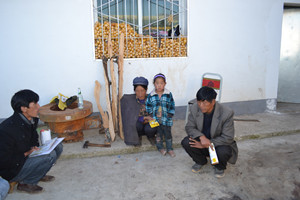Home \ Project News \ Field Officers’ Stories
Sichuan Liangshan Yi ethnic minority Autonomous Prefecture is one of the 3 Central Government directly supported HIV/AIDS hotspots with a much higher HIV/AIDS infection rate than the national average of 0.05%. Since 2010 HPP started to fight against HIV/AIDS, hand in hand and shoulder to shoulder with local people. In 2013 Humana People to People Baltic successfully got the donation from the Delegation of the European Union to China and Mongolia, to start a three-year Total Control of the Epidemic (TCE) project in Butuo County. The 2 local implementing partners are ‘Butuo County Women Federation’ and the ‘Liangshan Yi For Empowerment Center’ in Xichang.
The Butuo County Women Federation TCE project covers 100,000 people of 17 townships in Butuo. 23 local field officers are hired and supervised by project leader and deputy project leader. They are regularly trained by HPP. They visit the households and provide counseling services about HIV/AIDS prevention and control, mobilize people to receive HIV testing, promote condom use and distribute condoms for free. The Women Federation cadres at village, township and county levels are mobilized to be project activists, and they help to expand project impact. In the following, we are going to enter into the daily life of the Field Officers and get to know their work:
“Story One: Invisible AIDS” by Abu Zila
As a TCE field officer, my work is to publicize AIDS prevention education to all townships and villages, going into the village every day to do house visits, to train and mobilize and refer HIV positive villagers to the local clinic.
In the morning of February 12, 2016, I went to visit one household in Group 2, Bori village, Huolie County. At end of the visit, the head of the household suddenly asked me, “My neighbor’s face is covered with pimples because of AIDS, and everyone can tell that he got AIDS. But I don’t have any symptoms, and feel nothing wrong.” His wife added, “Is it not like this, that getting or not getting AIDS does not matter?.” I explained to them patiently, “AIDS is a Human Immunodeficiency Virus, and it is dormant. Later it breaks your immune system, and slowly diminishes your health, until you get sick and die. In the incubation period, you can’t see from appearance, only through testing one could diagnose the virus.”After this, she seemed understand something, and didn’t ask more. She said, “After you explain, I can see it is not so frightening as I thought, what we should do is to take preventive measures, take care of our body, respond to doctors’ anti-virus treatment well, it is even possible to prevent mother to child infection, and then to build a happy family.”
As a field officer, every time villagers get the help and knowledge they need, I feel happy from my heart, because this is my job.
“Story Two: Fragile Life” by Jili Ela
On May 10, 2015 I joined the Butuo TCE team, being in charge of Huoluojue Site, Tuojue Township. Time flies and one year past, in this year, I encountered many things, but one of the things which most struck me was my older aunt’s departure.
Life is precious because everyone only got one life. There are many sad stories, and my older aunt’s departure was because of AIDS. When I was little, I always went to her house to play. She was a very nice person, and treated me very well. But later she got AIDS without knowing why. Although government has good policy to provide free treatment to AIDS patients, and people could get free medicine, and the effect is well. For the living of the family, she left home to work outside. And because she then didn’t take medicine on time, she got sicker when working outside. After coming back home, she took medicine, but it didn’t work anymore, and finally she left us.
Although medical technology is developed, and government policy is very good, all of these won’t help in front of AIDS. Life is very fragile, let’s stay away from drug, and stay away from the virus. Field officer visiting households
Field officer visiting households Face to face training
Face to face training Distributing condoms
Distributing condoms
 AIDS prevention training to villagers
AIDS prevention training to villagers

